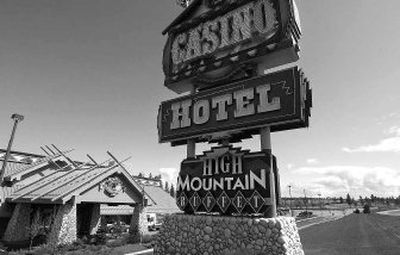The big payoff

After a century of poverty triggered by the loss of its land, the Coeur d’Alene Tribe has rebounded to become one of North Idaho’s top three employers.
More than 1,400 people work for the tribe, according to a University of Idaho study. The regional impact of wages, purchases and payments made by the tribe is $250 million annually, including the ripple effect of that money in rural communities, the study said.
“When I was a kid growing up here, there were no jobs. That’s changed in my lifetime, over the last 15 years,” said Chief Allan, Coeur d’Alene tribal chairman. “We are major players in the North Idaho economy.”
The study was commissioned by the tribe. It was conducted by Steven Peterson, a research economist at the University of Idaho’s College of Business and Economics, who has studied the role of tribal gaming in Idaho’s economy.
Gaming plays a substantial role in the Coeur d’Alenes’ prosperity. The tribe opened a small bingo hall beside U.S. Highway 95 in Worley in 1993, which has since grown into the Coeur d’Alene Casino Resort Hotel – a hospitality enterprise that employs about 900 people.
According to Peterson, tribal gaming has been so successful in revitalizing reservation economies that some refer to it as the “new buffalo.” That’s particularly true in cases such as the Coeur d’Alene Casino, which has evolved into a destination resort with a hotel, golf course, live entertainment and conference center, he said. More than 70 percent of the casino’s customers are from out of state, primarily from Washington.
Before the growth of the casino, unemployment among tribal members on the Coeur d’Alene Reservation was as high as 80 percent, he said. Now, “there’s a job for everyone who wants one.”
Despite the casino’s success, Allan said the tribe continues to look for ways to diversify its economy, because Indian gaming is always open to political challenges. Last year, the tribe purchased Berg Enterprises, a manufacturing firm, and moved it to Plummer.
Outside of gaming, 500 people work for the tribe in its government operations, at the Benewah Wellness Center and through other tribal business enterprises.
“The tribe plays a major role in both Kootenai and Benewah counties,” said Kathryn Tacke, a regional economist for the state of Idaho. “Over the last 20 years, it’s been the major reason for job growth in (rural) Benewah County.”
For overall employment in North Idaho, the tribe vies for second place with Hagadone Hospitality, which has about the same number of employees. Kootenai Medical Center, with 1,700 employees, is the area’s largest employer.